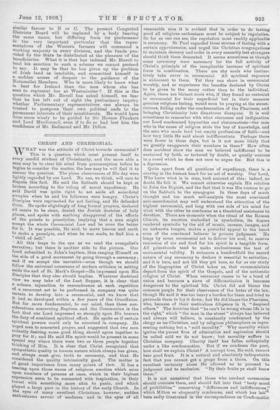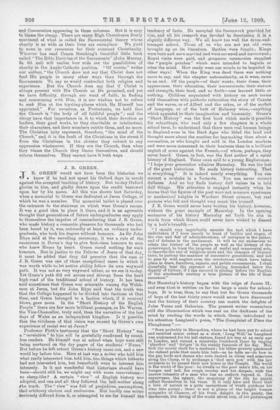CHRIST AND CEREMONIAL.
WHIT was the attitude of Christ towards ceremonial P This is a question which must present itself to every candid student of Christianity, and the more able a man may be to clear his mind from preconception before he begins to consider the matter, the less easy he will find it to answer the question. The pious observances of His day were lightly regarded by our Lord. No one, we think, will care to dispute this fact. He said the Sabbath should be kept or broken according to the ruling of moral expediency. He said David was quite right to set aside all sacerdotal Scruples when he and his followers were hungry. Christ's Disciples were reproached for not fasting, and He defended them. He spoke slightingly of long formal prayers, declared all meats to be clean, denied the Jewish doctrine of holy Places, and spoke with scathing disapproval of the efforts of the priests to proselytise, implying that a man might accept the whole Ceremonial Law and be none the better for it. It was possible, He said, to fliers heaven and earth to make a proselyte, and when he was made, to find him a " child of hell."
All this leaps to the eye as we read the evangelist's narrative ; but there is another side to the picture. Our Lord submitted to John's baptism, thus ranging Himself on the side of a good movement by going through a ceremony ; and if we accept the narrative—even though we should follow the universal consensus of modern criticism in setting aside the end of St. Mark's Gospel—He impressed upon His Disciples that they also should baptise. Whatever doctrinal view we may take • of the Last Supper, it is clear that a solemn injunction to remembrance at each repetition of a recurrent act to be performed in company was quite certain to develop into a ceremonial, and we know that it Lad so developed within a few years of the Crucifixion. But far more fundamental, to our mind, than these con- siderations concerning Baptism and the Communion is the fact that our Lord impressed so strongly upon His hearers the duty of combined spiritual effort. He spoke as if certain spiritual powers could only be exercised in company. He Urged men to concerted prayer, and suggested that two men ardently desiring some good thing should agree together to Pray for it ; and He said His spirit would be present in some special way where there were two or three people together thinking of Him. It is clear that Christ recognised that Sympathetic quality in human nature which always has given, and always must give, birth to ceremony, and that He considered the quality intrinsically good. The matter is of great importance from many points of view. It has a bearing upon those waves of religious emotion which seize Upon numbers of persons at once, which in their highest expression seem to be connected with inspiration, in their lowest with something more akin to panic, and which Played a large part in the history of the early Church. In the eyes of many excellent Christians, however, sudden enthusiasms savour of madness, and in the eyes of all
reasonable men it is evident that in order to do lasting good all religious enthusiasm must be subject to regulation. So far as one can see, the regulation most readily applicable is ceremony. St. Paul regarded these storms of feeling with a certain apprehension, and urged the Christian congregations to maintain decency and order in every assembly lest strangers should think them demented. It seems sometimes as though some ceremony were necessary for the full activity of Christ's principle of the inexplicable increase of spiritual force in combination. There are shy souls who instinc- tively take cover in ceremonial. All spiritual exposure is abhorrent to them. Yet they can share in ceremonial worship, and so experience the benefits declared by Christ to be given to the many rather than to the individual. Again, there are blatant souls who, if they found no restraint in ceremonial for their superficial but in their measure genuine religions feeling, would soon be praying at the street. corners, falling under the condemnation of the Pharisees, and bringing Christianity into disastrous disrepute. It is well sometimes to remember with what sternness and indignation our Lord condemned hypocrites and obscurautists—the men who in the cause of religion stole the key of knowledge, and the men who made loud but empty professions of faith—and how very little He said about indifferentists. Perhaps there were fewer in those days, but is it not more likely that we greatly exaggerate their numbers in these ? How often does accident show the man we believed indifferent to be sustained by faith, or tortured by doubt, or quietly content in a creed which he does not care to argue for. But this is a digression.
Quite apart from all questions of expediency, there is a craving in time human heart for an act of worship. Our Lord, Who knew what is in man, took account of this; indeed, no doubt He felt it. We cannot otherwise explain His relation to John the Baptist, and the fact that it was His custom to go on the Sabbath to the synagogue. In these days of much thought and too much self-analysis the most convinced anti-sacerdotalist may well understand the attraction of the highest ceremonial, and long with one side of his mind for what with the other he condemns as a theatrical assistance to devotion. There are moments when the ritual of the Roman Church, its emotion embodied in symbolism, its dogma rendered symbolic by the aid of music, incense, images, and an unknown tongue, makes a powerful appeal to the heart even of the convinced believer in private judgment. He longs by some ceremonial act to deliver his soul, to receive remission of sin and food for his spirit in a tangible form. All priesthoods tend to make exclusiveness the test of sacramental validity. It enhances a hundredfold the sacred nature of any ceremony to declare it essential to salvation; and it is here, and not till they get here, so far as our study of the biographies of Christ takes us, that ceremonialists depart from the spirit of the Gospels, and of the authentic religion of Christ. When ceremony ceases to be a bond of union and becomes a sieve of differentiation it becomes dangerous to the spiritual life. Christ did not blame the common people for their observance of the letter of the law, though Ho said it was too heavy a burden for them and tried to persuade them to lay it down; but He did blame the Pharisees,
who, because of their meticulous diligence in it, "despised others." The doctrine that "he can't be wrong whose life is in the right," which " the man in the street" always has believed and always will believe, is constantly condemned by the clergy as un-Christian, and by religious philosophers as repre- sentipg nothing but a " cold morality." Why morality which ignites the purest fires of admiration and aspiration should be called cold we do not know ; but morality suffers in Christian company. Charity itself has fallen colloquially under a like condemnation. But if we condemn the poet,
how shall we explain Christ P A corrupt tree, He said, cannot
bear good fruit. It is a natural and absolutely indisputable fact that you cannot get a grape front a thorn. On this excellent certainty alone He allowed us to proceed to judgment and to exclusion. " By their fruits ye shall know them."
It is not unnatural that those who conduct ceremonies should overrate them, and should fall into that "testy mood of prohibition" concerning "differences and indifferences which Milton so eloquently ccudemns, and which has lati" been sadly illustrated in the correspondence on Confirmatiot
and Communion appearing in these columns. But it is easy to blame the clergy.. There are many High Churchmen firmly convinced of what is called the Sacramental theory whose cherity is as wide as their lives are exemplery. We yield to none in our reverence for their constant Christiau4. Whoever has read Canon Beeching's beautiful little book called " The 13ible Doctrine of the Sacraments" (John Murray, 2s. 6d. net) will realise how wide are the possibilities of charity in the Anglo-Catholic position. "Of course," writes our author, "the Cherch iloes not say that Christ does not feed His people in many other ways than through the Sacraments. To say SQ would contradict both religion and experience. But the Church does say that if Christ is always present with Iis Church as He promised, and yet we have difficulty, through our want of faith, in finding anci communing with Him, it is our wisdom not to refuse te seek Him at the trysting-places which He Himself has appointed." For ourselves, as Protestants, we bold that the Church i5 "the body of all faithful people "; and the clergy have that importance in it to which their devotion as leaders, their good works, be they charitable or intellectual, their characters, and their numbers entitle them, and no more. The Christian laity represent, therefore, "the mind of the Church," and it is the fault of the Christians in the street if from the Christians in the cloister they submit to upy oppression whatsoever. If they are the Church, then when they blame the Church they blame themselves, and should reform themselves. They cannot have it both ways.











































 Previous page
Previous page